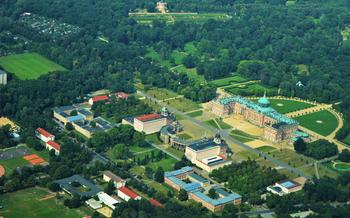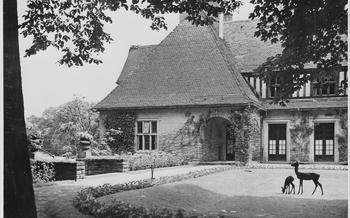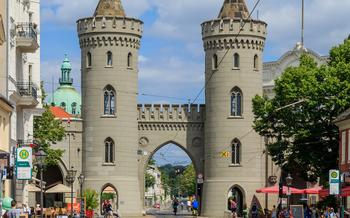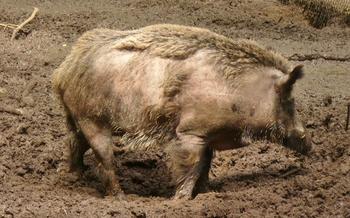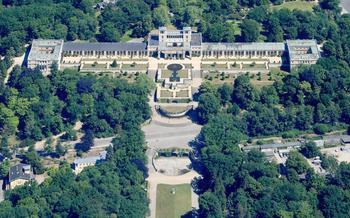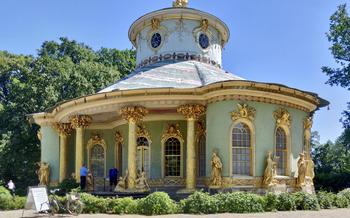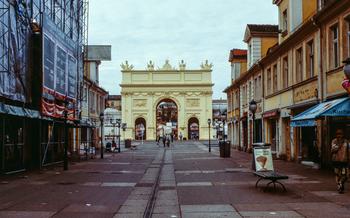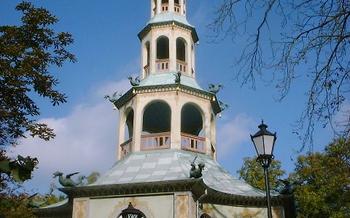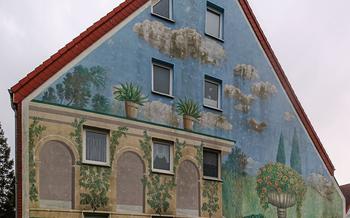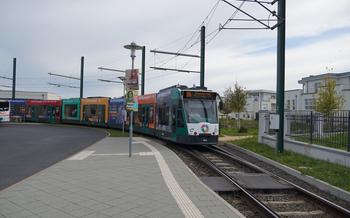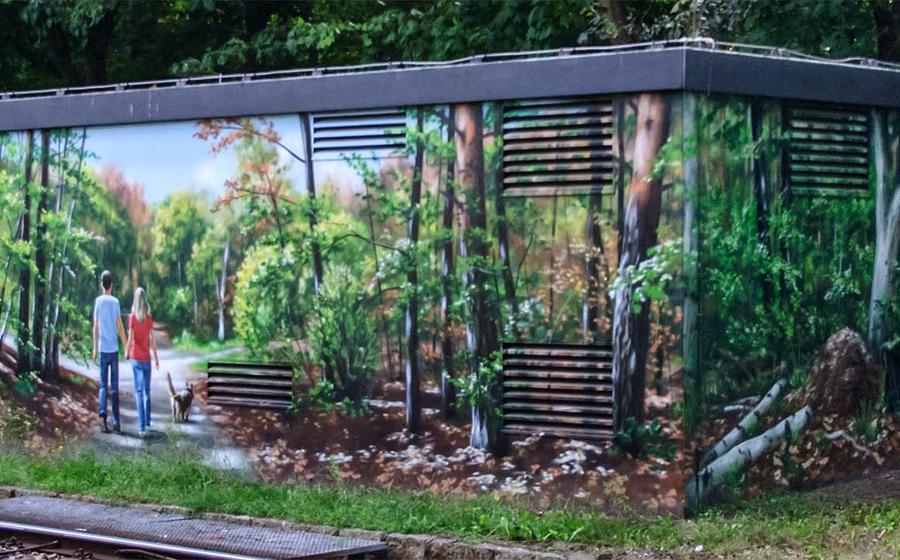
The Japanese Bonsai Garden (Japanischer Bonsaigarten, Ferch)
- A Japanese Haven in Germany
- Immerse in Serenity
- Diverse Collection of Bonsai Trees
- Symbolism and Aesthetics
- Guided Tours and Workshops
- Seasonal Highlights
- Garden Layout and Design
- Bonsai Nursery and Shop
- Educational Programs
- Events and Exhibitions
- Accessibility and Location
- Combine with Nearby Attractions
- Resources and Further Information
- Insider Tip: Enhance Your Experience
A Japanese Haven in Germany
In the tranquil town of Ferch, nestled amidst the serene landscape of Brandenburg, lies a Japanese treasure that transports visitors to the heart of East Asia. The Japanese Bonsai Garden, known as the Japanischer Bonsaigarten in German, is a unique haven that celebrates the ancient Japanese art of bonsai and fosters cultural exchange between Germany and Japan.
Established in 1987 as a symbol of friendship between the two nations, the garden draws inspiration from the centuries-old Japanese tradition of cultivating miniature trees. Its founder, Dr. Hermann Klose, a passionate bonsai enthusiast, envisioned a space that would showcase the beauty and artistry of bonsai while promoting cross-cultural understanding.
Immerse in Serenity
The Japanese Bonsai Garden offers a haven of tranquility, inviting visitors to escape the hustle and bustle of everyday life. Pathways meander through the garden, gently guiding you past meticulously manicured bonsai trees, serene ponds, and cascading waterfalls. The sound of flowing water and birdsong creates a symphony of nature, enhancing the sense of peace and relaxation. Find a peaceful spot beneath the shade of a maple tree, close your eyes, and let the tranquility of this enchanting garden envelop you.
Diverse Collection of Bonsai Trees
The Japanese Bonsai Garden in Ferch boasts an impressive collection of bonsai trees, representing a wide variety of species and styles. Stroll through the garden and marvel at the intricate miniature landscapes created by skilled gardeners. Each tree is a testament to the dedication and craftsmanship involved in the art of bonsai. Observe the different shapes, sizes, and colors of the trees, ranging from majestic pines to delicate maples. Discover the unique characteristics of each species and learn about the techniques used to cultivate and maintain these living works of art.
The garden's collection includes both native European and exotic Japanese species, allowing visitors to appreciate the diversity of bonsai cultivation. Whether you are a seasoned bonsai enthusiast or simply curious about this ancient art form, the Japanese Bonsai Garden in Ferch offers a fascinating glimpse into the world of miniature trees.
Symbolism and Aesthetics
Bonsai, with its roots deeply embedded in Japanese tradition, carries significant cultural symbolism. It represents the ancient Japanese art form of creating miniature landscapes, capturing the essence of nature in a small, contained space. The garden's design reflects this philosophy, showcasing harmony, balance, and asymmetry. The trees, carefully positioned and shaped, embody the concept of wabi-sabi, which celebrates the beauty of imperfection and the passage of time. This fusion of aesthetics and symbolism creates a serene and contemplative space, inviting visitors to immerse themselves in the tranquility of nature and the richness of Japanese culture.
Guided Tours and Workshops
For those seeking a more immersive experience, guided tours are available in both German and English. Led by knowledgeable guides, these tours provide in-depth explanations about the history, symbolism, and cultivation techniques of bonsai. Participants gain valuable insights into the art of miniature landscapes, uncovering the stories behind the meticulously shaped trees.
Additionally, the garden offers hands-on workshops, where visitors can learn the basics of bonsai cultivation under the guidance of experienced enthusiasts. These workshops provide a unique opportunity to prune, wire, and style your own bonsai tree, creating a lasting memento of your visit. Whether you are a seasoned bonsai enthusiast or a curious beginner, these workshops offer a chance to deepen your understanding of this ancient art form.
Seasonal Highlights
The Japanese Bonsai Garden in Ferch undergoes a remarkable transformation throughout the year, offering a diverse range of seasonal highlights. In the spring, the garden comes alive with the delicate beauty of cherry blossoms, a spectacle known as Hanami in Japanese culture. Visitors can stroll beneath a canopy of pink and white blossoms, creating a truly enchanting atmosphere. As summer approaches, the garden bursts into vibrant colors with lush greenery, blooming flowers, and the gentle buzzing of insects.
In autumn, the garden transforms into a kaleidoscope of warm hues, with the leaves of the maple trees turning shades of fiery red, orange, and yellow. The contrast between the vibrant foliage and the evergreen bonsai trees creates a breathtaking sight. As winter arrives, the garden takes on a serene and peaceful ambiance, with snow-covered landscapes and the sound of crunching snow underfoot. The bonsai trees stand resilient against the cold, their intricate branches and silhouettes creating a striking contrast against the white backdrop.
Garden Layout and Design
The Japanese Bonsai Garden in Ferch is a testament to the harmonious fusion of Japanese aesthetics and gardening traditions. As you step into the garden, you'll be greeted by a meandering network of paths that lead you through different sections, each offering unique perspectives and experiences. The garden's layout is designed to evoke a sense of tranquility and serenity, with strategically placed ponds, waterfalls, and rock arrangements creating a calming ambiance.
Traditional Japanese elements such as a teahouse and viewing platforms are seamlessly integrated into the landscape, providing opportunities for visitors to relax, meditate, and appreciate the beauty of the bonsai trees from various vantage points. The garden's design showcases the Japanese philosophy of "shakkei," or borrowed scenery, where the surrounding natural environment is incorporated into the garden's composition, creating a sense of vastness and depth.
Bonsai Nursery and Shop
In addition to admiring the stunning collection of bonsai trees, visitors to the Japanese Bonsai Garden in Ferch can also purchase their own bonsai trees and related items at the on-site nursery and shop. Here, visitors will find a wide variety of bonsai species, including Japanese maples, pines, and junipers, as well as a selection of bonsai pots, tools, and accessories. The knowledgeable and experienced staff is always on hand to offer expert advice and guidance on selecting the right bonsai tree for your needs and budget.
The nursery also offers a variety of workshops and demonstrations on bonsai care and cultivation, providing visitors with the opportunity to learn from experienced bonsai enthusiasts and gain hands-on experience in the art of bonsai. These workshops are a great way to deepen your understanding of bonsai cultivation and create your own miniature masterpiece.
Educational Programs
In addition to its stunning beauty and diverse collection of bonsai trees, the Japanese Bonsai Garden in Ferch is also a hub for educational initiatives. The garden offers a range of programs designed to promote cultural understanding and foster a deeper appreciation for the art of bonsai.
-
School Programs: The garden welcomes school groups for educational visits, providing guided tours and workshops tailored to different age levels. Students learn about the history and symbolism of bonsai, the techniques involved in their cultivation, and the importance of preserving Japanese cultural traditions.
-
Workshops: The garden regularly hosts workshops on various aspects of bonsai cultivation, open to both enthusiasts and beginners. Participants can learn about bonsai care, pruning techniques, and styling, and receive hands-on experience under the guidance of experienced instructors.
-
Lectures and Presentations: Throughout the year, the garden organizes lectures and presentations by renowned bonsai experts, covering topics such as the history of bonsai, different bonsai styles, and the philosophy behind this ancient art form. These events provide an opportunity for visitors to gain in-depth knowledge and insights into the world of bonsai.
-
Cultural Understanding: By promoting educational programs, the Japanese Bonsai Garden in Ferch plays a significant role in fostering cultural exchange and understanding between Germany and Japan. It offers a unique platform for visitors to learn about Japanese culture, traditions, and aesthetics, while appreciating the beauty and artistry of bonsai.
Events and Exhibitions
The Japanese Bonsai Garden hosts a variety of events and exhibitions throughout the year, showcasing the art of bonsai and promoting cultural exchange. These events provide an opportunity for visitors to learn more about bonsai cultivation, appreciate the beauty of these miniature landscapes, and interact with fellow enthusiasts.
Regular events include demonstrations by renowned bonsai masters, where visitors can witness the skilled techniques and artistry involved in shaping and maintaining bonsai trees. Competitions and exhibitions are held to recognize exceptional bonsai creations, showcasing the diversity and creativity of the art form. These events offer a platform for bonsai enthusiasts to share their passion and knowledge, and for visitors to admire the stunning results of their dedication.
Attending events and exhibitions at the Japanese Bonsai Garden is a great way to immerse yourself in the world of bonsai, learn from experts, and appreciate the cultural significance of this ancient art form. Whether you're a seasoned bonsai enthusiast or simply curious about this unique tradition, these events offer a rich and rewarding experience.
Accessibility and Location
Reaching the Japanese Bonsai Garden is a breeze, whether you're coming from Berlin or Potsdam. Multiple public transportation options, including regional trains and buses, will take you to Ferch, the charming town where the garden resides. Once there, follow the picturesque signs leading you to this tranquil oasis.
For those who prefer the convenience of driving, the garden offers ample parking space. And for those with limited mobility, the garden is wheelchair accessible, ensuring everyone can immerse themselves in the serenity of this unique Japanese haven.
Combine with Nearby Attractions
In addition to immersing yourself in the serene beauty of the Japanese Bonsai Garden, take the opportunity to explore the surrounding area and discover other cultural and historical treasures. The picturesque town of Ferch, where the garden is located, boasts a rich history dating back to the Middle Ages. Stroll along its charming streets, admire the well-preserved timber-framed houses, and visit the local Heimatmuseum to learn more about the town's past and traditions.
Just a short distance away lies the magnificent Park Sanssouci, a UNESCO World Heritage Site and one of the most beautiful examples of Prussian garden art. Wander through its sprawling grounds, marvel at the elegant palaces and follies, and soak up the tranquil atmosphere.
Potsdam, the capital of the state of Brandenburg, is a treasure trove of cultural and historical landmarks. Explore the opulent palaces, including the Sanssouci Palace, the Neues Palais, and the Cecilienhof Palace, each with its own unique architectural style and history. Admire the stunning gardens, lakes, and sculptures that adorn the city, and take a leisurely boat trip along the Havel River for a different perspective.
If you're planning a day trip from Berlin, the Japanese Bonsai Garden and the surrounding attractions offer a perfect blend of nature, culture, and history. Easily accessible by train or car, this region promises a memorable and enriching experience for travelers of all ages.
Resources and Further Information
- For further exploration, visit the official website of the Japanese Bonsai Garden for detailed information about the garden, its history, and upcoming events.
- Delve deeper into the world of bonsai through publications and books dedicated to the garden, offering insights into its unique collection and the art of miniature landscapes.
- Enrich your knowledge with online resources that provide comprehensive guides to bonsai cultivation, history, and symbolism, allowing you to continue your learning journey beyond your visit.
- Stay connected with the garden's social media channels to receive updates on events, workshops, and exhibitions, ensuring you don't miss any highlights during your visit.
Insider Tip: Enhance Your Experience
To fully immerse yourself in the serene ambiance of the garden, visit during the early morning or late afternoon when the crowds are fewer. This allows you to leisurely explore the various sections, soak in the tranquil atmosphere, and appreciate the intricate details of each bonsai.
Consider joining a guided tour to gain a deeper understanding of bonsai cultivation, its history, and significance in Japanese culture. The knowledgeable guides provide insights into the art form, the techniques used, and the philosophy behind bonsai.
Enhance your visit by combining it with a leisurely stroll along the scenic shores of Lake Ferch. This picturesque lake, just a short walk from the garden, offers breathtaking views, tranquil waters, and a chance to connect with nature.
